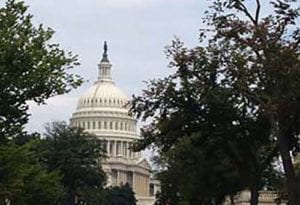Nine consumer advocacy groups sent a joint letter to Congress dealing with passenger protections.
 This letter deals with travelers’ urgent needs and priorities exacerbated by the pandemic. It also deals with passenger protections not finalized in the current bill.
This letter deals with travelers’ urgent needs and priorities exacerbated by the pandemic. It also deals with passenger protections not finalized in the current bill.
This joint action by the US’s largest consumer and travel advocates is a recent development. This group was created through the efforts of Travelers United during the past three administrations in Washington, DC.
In the letter, the nine organizations identified a range of legislative reforms needed to address consumers’ concerns. These can be enacted via the Federal Aviation Administration (FAA) reauthorization. Minor children are to be seated with their parents or caregivers at no extra cost. Travelers should be able to board the next available flight (regardless of airline) when their original flight is delayed. And ancillary fees must be transparent and proportional to the cost of the service provided.
———————————————————–
RE: Consumer and Passenger Rights Organizations’ Priorities for the 2023 FAA Reauthorization Legislation
 Dear Chairman DeFazio, Chair Cantwell, Ranking Member Graves, and Ranking Member Wicker,
Dear Chairman DeFazio, Chair Cantwell, Ranking Member Graves, and Ranking Member Wicker,
The undersigned consumer and passenger rights organizations urge you to use the opportunity of reauthorizing the FAA next year to address a range of urgently needed passenger protections and industry reforms. Congress appropriated more than $50 billion to the air travel industry during the pandemic, Travelers across the United States have been clear in their demands for changes to the business practices of air carriers. We believe the following legislative reforms are urgently needed to address consumers’ concerns.
Minimize Flight Cancellations and Delays
Congress should institute an industry-wide reciprocity requirement. When a flight is significantly delayed or canceled, passengers should be transferred to another carrier if the second carrier can transport the travelers more quickly than the original carrier. This would benefit travelers by ensuring minimal disruption to their schedules. It will also incentivize airlines to reliably maintain their flight schedules, increasing competition in the airline industry.
Hold airlines accountable for chronically delayed and canceled flights. Air carriers should be required to maintain a minimum percentage of on-time flights per month based on a review of the carrier’s published schedule and actual performance. This would allow the Department of Transportation (DOT) to hold airlines accountable when they routinely publish inoperable flight schedules. This will be an essential airline passenger protection.
Require plain language notices of passenger compensation rights under US and international law throughout public airports. Such notices should specifically include rights afforded by the Montreal Convention and the EU’s Flight Compensation Regulation, as many American travelers may be unaware of the international rights to which they are entitled.
Reform Airline Fees, Seating, and Rewards
Include the Forbidding Airlines from Imposing Ridiculous (FAIR) Fees Act in the 2023 FAA Reauthorization. The FAIR Fees Act would prohibit air carriers from charging fees (including baggage, seating, and reservation change fees) that are not reasonable and proportional to the services’ costs.
Ensure parents and caregivers can be seated with their children at no additional charge. Congress has previously urged the DOT to act on family seating requirements in the 2016 FAA Reauthorization. Yet, the Department’s only action was to update a web page on the issue. Parents and caregivers should not be required to pay a fee to ensure they can sit next to their minor children on a flight.
Establish basic service standards for air travel. Passengers should be entitled to, at a minimum: a seat, a boarding pass, check-in services, a personal item, a carry-on item, water, and an accessible lavatory included in the ticket price. Additionally, air carriers should be required to maintain a toll-free customer service phone number with adequate staffing, to ensure wait times do not exceed 30 minutes.
Require transparent, upfront airfare pricing at the outset of the purchase process. Consumers respond to an advertised ticket price but are faced with additional fees for basic services like baggage, seat reservation, and other ancillary charges throughout the purchase process. This often results in a much higher total cost than originally advertised. Displaying what is included in the fare from the onset will help alleviate the sticker shock many travelers face by the end of their purchase and promote competition between airlines.
End the excise tax exemption for ancillary service fees.
Ancillary fees—a multi-billion dollar source of revenue—currently escape excise taxation, depriving the Airport & Airway Trust Fund (AATF) of resources needed to maintain critical infrastructure. This loophole significantly incentivizes airlines to pass more ancillary fees on to consumers.
Narrowly define “service” as it relates to federal preemption and the Airline Deregulation Act of 1978 (ADA). Judicial interpretations of the ADA’s preemption of the regulation of conduct which “relates to service” are expansive and preclude the regulation of virtually any action an air carrier takes during a flight or customer service operation. This effectively preempts states from protecting travelers in most situations. Removing the phrase “relates to” and clarifying that “service” only includes the frequency and scheduling of transportation on a certain route will reinstate Congress’s original intent in the ADA while enabling state consumer protection agencies to backstop the DOT’s role in protecting the flying public.
Establish a minimum passenger seat size. Shrinking seat sizes cause health risks and passenger discomfort, creating potential evacuation hazards. The 2018 FAA Reauthorization required the FAA to set minimum passenger seat width and pitch within one year of the Reauthorization’s enactment. Almost four years later, the FAA still has not fulfilled this mandate. Congress must act when the agency will not.
Before the devaluation of their frequent flyer program, miles requires reasonable notice to consumers. Currently, miles accrued via frequent flyer programs lack important consumer safeguards. A minimum of 60-day notice before devaluing travelers’ frequent flyer miles will increase transparency and allow consumers to make better-informed decisions.
Enable Stronger Enforcement of Passenger Protections
Empower state attorneys general to enforce federal consumer protection laws. The DOT lacks the resources to address many valid complaints from travelers. For example, despite a record surge in consumer complaints during the pandemic, the DOT has initiated only a single enforcement action against an airline. Allow state attorneys general to share enforcement of federal consumer protection laws with the DOT. This will provide an additional avenue for consumers to seek redress.
Establish a private right of action to allow consumers to enforce federal consumer protection laws. Empowering passengers to bring their actions in response to unfair, deceptive, and discriminatory practices will help to hold air carriers accountable without waiting for federal intervention.
Direct the Government Accountability Office (GAO) to report on DOT rulemaking efficiency. The DOT’s failure to issue statutorily required regulations regarding passenger seat size is not an isolated instance. Congress should direct the GAO to produce a report examining why the DOT has not yet completed statutorily mandated regulations from previous FAA reauthorization bills.
Prioritize Consumer Voices and Experiences
Renew the charter for the Aviation Consumer Protection Advisory Committee (ACPAC). The ACPAC has provided expertise on consumer protection matters to the DOT for over a decade. It will continue to play a critical role as the air travel industry recovers from the COVID-19 pandemic. The ACPAC has been an essential venue for consumers to make their voices heard at the DOT. Absent Congressional action, the authorization for the ACPAC will expire on June 28, 2023.
Require at least two passenger representatives on airport authority governing boards. Underrepresentation of passenger interests on airport authority governing boards has allowed many airports to deprioritize passenger convenience, faster travel time, and consumer expenses. Conditioning federal subsidies and licensure for airports on passenger representation on airport authority governing boards would incentivize airports to prioritize travelers’ airport experience.
Ease the creation of new airports.
The last major airport was built in 1995. It increased the number of airports that can help with congestion and create new, possibly shorter flight paths. Ending the prohibition on federal ownership of airports would free up additional resources for airport construction projects. Additionally, state and local governments should be encouraged to build new airports, especially at major hubs.
T
Sincerely,
American Economic Liberties Project
Business Travel Coalition
Consumer Action
Consumer Federation of America
EdOnTravel.com
FlyersRights.org
National Consumers League
Travelers United
U.S. Public Interest Research Group
READ ALSO:
Stupid travel mistakes and how to avoid them
Why good customer service suffers during post-COVID airline passenger crush

Charlie Leocha is the President of Travelers United. He has been working in Washington, DC, for the past 14 years with Congress, the Department of Transportation, and industry stakeholders on travel issues. He was the first consumer representative to the Advisory Committee for Aviation Consumer Protections appointed by the Secretary of Transportation from 2012 through 2018.



